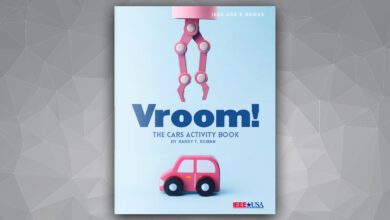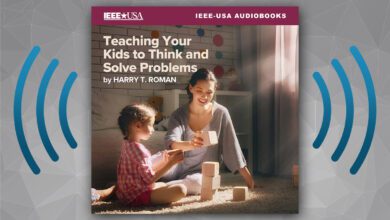
IEEE-USA thanks Representatives Jerry McNerney, Raja Krishnamoorthi, Haley Stevens, Jim Baird, Bruce Westerman, Chrissy Houlahan, Paul Tonko, Raúl Grijalva, Eddie Bernice Johnson, Randy Weber, Derek Kilmer, Bill Foster, Sean Casten, Kevin Hern, Bobby Rush, Deborah Ross, Dina Titus, Ruben Gallego, Mike Doyle, and Lisa Blunt Rochester for sponsoring House Resolution 164, supporting the goals and ideals of National Engineers Week, 21 – 27 February 2021.
EWeek, as it is commonly called, is dedicated to ensuring a diverse and well-educated future engineering workforce by increasing understanding of and interest in engineering and technology careers. IEEE-USA has spearheaded IEEE’s participation in EWeek for more than three decades, acting as lead engineering society twice.
Today, EWeek is a formal coalition of more than 70 engineering, education, and cultural societies, and more than 50 corporations and government agencies. Dedicated to raising public awareness of engineers’ positive contributions to quality of life, EWeek promotes recognition among parents, teachers, and students of the importance of a technical education and a high level of math, science, and technology literacy, and motivates youth to pursue engineering careers in order to provide a diverse and vigorous engineering workforce. Each year, EWeek reaches thousands of schools, businesses, and community groups across the United States.
Among the many EWeek activities are its Future of Engineering Webinar, Creating Inclusive STEM Experiences – DiscoverE Webinar, the Virtual Federal Engineer of the Year Award Ceremony, and, perhaps most importantly, Introduce a Girl to Engineering Day. Learn much more at https://www.nspe.org/resources/partners-and-state-societies/engineers-week.
Also underway is the DiscoverE Future City Competition, which challenges middle-school students to imagine, design, and build cities of the future. Teams learn about the wonders of engineering, use the engineering design process to address civic and social issues, and become change-makers in their own communities. On 13 March, IEEE-USA President Kate Duncan will participate as a virtual judge for the IEEE-USA special award, and later make a virtual presentation announcing the winner. See Future City | DiscoverE Engineering.
Below is the resolution introduced by Representative McNerney on behalf of himself and his nineteen House colleagues. Our thanks to all for recognizing and promoting the DiscoverE program.
RESOLUTION
H.RES. 164
Supporting the goals and ideals of National Engineers Week.
Whereas engineers employ their scientific knowledge and analytical skills for the betterment of the United States and for the protection of the public health, safety, and welfare;
Whereas the mission of the National Engineers Week Foundation (doing business as DiscoverE) is to sustain and grow a dynamic engineering profession through outreach, education, celebration, and volunteerism as needed to keep the United States a global leader in engineering and engineering education;
Whereas the sponsors of National Engineers Week are working together to transform the engineering workforce through greater inclusion of women and underrepresented minorities;
Whereas by engaging young students, parents, and educators in hands-on science, technology, engineering, and mathematics (STEM) activities, engineers help them discover how they can make a meaningful difference in the world;
Whereas the partnership between engineers and teachers inspires future generations of engineering and technology talent;
Whereas tens of thousands of engineers and engineering students will serve their communities not only through their work but, at this time of year, by reaching into hundreds of local communities;
Whereas the perspective and technical expertise of engineers is vital to solving today’s most pressing global challenges—including infrastructure, national security, and environmental sustainability—and the professional engineer’s commitment to high ethical standards is necessary for the protection of public health, safety, and welfare;
Whereas “science creates more opportunity for the next generation”, according to the National Science Board’s 2018 Science and Engineering Indicators;
Whereas engineers are a crucial link in research, development, and the transformation of scientific discoveries into useful products and jobs, as the people of the United States look more than ever to engineers and their imagination, knowledge, and analytical skills to meet the challenges of the future;
Whereas the National Science Board’s 2018 Science and Engineering Indicators show that the number of students obtaining engineering bachelor’s degrees in the United States has increased steadily for the last 15 years for which data are available, yet the rates for women do not reflect our national demographics, with only 20 percent of bachelor’s degrees in engineering being earned by women;
Whereas the National Science Board’s “Science and Engineering Indicators 2020” shows that historically underrepresented racial and ethnic groups, particularly Blacks and Hispanics, “remain underrepresented in the [science & engineering (S&E)] workforce relative to their overall presence in the workforce and the population”;
Whereas the National Science Foundation’s National Center for Science and Engineering Statistics report on “Women, Minorities, and Persons with Disabilities in Science and Engineering 2017” shows that women are closing the gap with men in S&E educational attainment but are still underrepresented in S&E occupations;
Whereas only around 4 percent of the Nation’s workforce is comprised of scientists and engineers, yet this group disproportionately creates jobs for the other 96 percent;
Whereas DiscoverE has grown into a formal coalition of more than 100 professional societies, major corporations, and government agencies that serves as a hub of engineering outreach dedicated to ensuring a diverse and well-educated engineering workforce, promoting literacy in science, technology, engineering, and mathematics, and raising public awareness and appreciation of the contributions of engineers to society;
Whereas Congress has recognized National Engineers Week every year since 1951; and
Whereas February 21, 2021, to February 27, 2021, has been designated as National Engineers Week by DiscoverE and the theme is “Imagining Tomorrow”, spotlighting the important contributions of the engineering community to our quality of life both now and in the future, including creating a world safe from pandemics, climate change, and other global challenges; creating awe-inspiring wonders like cloud-busting skyscrapers and human travel to Mars; and daily marvels like clean drinking water, computers, and cars: Now, therefore, be it
Resolved, That the House of Representatives—
(1) supports the goals and ideals of National Engineers Week to increase understanding of and interest in engineering and technology careers and to promote technological literacy and engineering education;
(2) recognizes that engineering education is a critical component of STEM (science, technology, engineering, and mathematics) education and essential to improving the United States educational system and economic prosperity; and
(3) ensures that technological solutions designed by the engineering community can be advanced through research, development, standardization, and innovation.
Brendan Godfrey is IEEE-USA’s vice president for Communications & Public Awareness.






